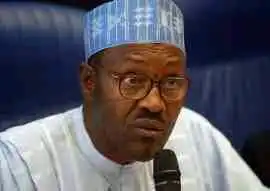
President Muhammadu Buhari has today stated that in appointing his ministers and assigning portfolios to them, he was conscious of the need not to repeat mistakes made by previous administrations where the right people were allocated wrong portfolios.
That unfortunate situation of the past, he said, translated into the former ministers performing poorly to the country's detriment despite their capabilities.
Buhari stated this shortly after administering oath of office on his 36 ministers inside the Presidential Villa, Abuja.
The President said: "Today we have reached another milestone in the evolution of our new government which Nigerians overwhelmingly voted into office in the March 28th, 2015 general elections.
"Today we witness the swearing-in of new ministers of the government of the Federal Republic of Nigeria.
"Since our inauguration on May 29, 2015, the Vice President and I have been mindful of the need to constitute a cabinet that will best deliver our expectations of a better country than we inherited.
"We want to work towards a prosperous nation respected for the right reasons, and whose citizens can hold up their heads anywhere in the world.
"And we are optimistic that bringing this set of ministers into the service of our country today is a step in the right direction, a timely move towards realising our positive goals for our country.
"Since we assumed office in May, I have been mindful of the need to ensure that the appointment of new ministers translates into putting round pegs in round holes while showing sensitivity to our diversity as a people and our various positions as groups of stakeholders in our country."
Buhari added: "Also, I have responded to the counsel to consult as widely as possible, given the need to build a stable and all-inclusive government by reaching across our various ethnic and political divides."
Buhari stated with the inauguration of the ministers, his government will continue more decisively to implement its policies in respect of the economy and in other areas.
As stated by him, while working hard to maximise revenue from oil in the face of a sharp decline in the price for the commodity, his administration was determined to diversify the economy in agriculture in order to enhance employment and explore solid minerals as a major revenue earner.
He stated the primary aim, is to achieve self-sufficiency in the production of such staples as rice and wheat and to become a major consumer and exporter of both items as well as solid minerals.